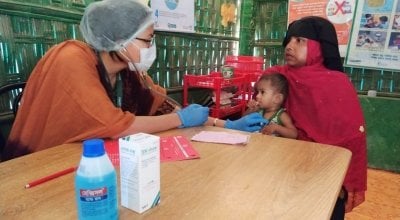
Knowledge Hub
Five ways we’re responding to the coronavirus pandemic

There are now cases of coronavirus in all nearly all of the 23 countries we work in. Here’s how our expert teams on the ground are responding and helping to save lives.
1. Distributing hygiene kits

One thing we’ve learned through our work to prevent the transmission of other disease outbreaks like Ebola is that hygiene is critical to reduce the spread of a pandemic like Covid-19. As a result, our teams in-country have long been incorporating hygiene education into almost everything we do.
Now we’re applying this knowledge to assemble hygiene kits containing soap bars, detergent and sanitary pads and distributing them across countries including Iraq, Afghanistan, Lebanon and Syria. In Syria, the refugee communities we’re helping are particularly vulnerable to Covid-19 due to crowded living conditions, inadequate shelter and limited access to handwashing facilities. We’ve rapidly scaled up the distribution of hygiene kits across camps and informal settlements and launched promotional campaigns on best handwashing practices.
2. Installing handwashing stations

In Sierra Leone, we’re working with the START Network to install handwashing points at 50 key community locations including transport areas, petrol stations and markets. These include buckets with a tap, bucket stands, soap and large storage tanks. Trucks are also bringing in fresh supplies of clean water every day, as access is limited.
We’ve replicated this work in Niger, where handwashing points have also been set up in health centres, and installed water tanks in Taloqan prison in Afghanistan where we’ve previously worked to meet urgent needs by providing warm clothes for the winter.
3. Promoting social distancing

61 per cent of the world’s employed population make their living from casual work – if people are forced to remain isolated at home, they could struggle to earn a wage and feed their families.
In Malawi, we’re adapting our livelihoods programme to promote social distancing while enabling people to continue working. We have reduced the size of meetings, ensured that the farmers we are working with maintain a physical distance from each other and introduced mandatory handwashing before and after training sessions. In South Sudan, Concern’s health and nutrition centres are staggering appointment times and limiting training sessions for health workers to 10 people at a time, in line with government restrictions.
4. Creating awareness campaigns

Another vital step that can help reduce the spread of coronavirus is communicating accurate and up-to-date information as effectively as possible. In 21 countries, we’ve been collaborating with governments and community leaders to share messages about hygiene and prevention. In Niger and the Central African Republic (CAR) we've shared advice over the radio, and in Sierra Leone we're training healthcare workers and traditional healers to share information about the virus with their communities.
We’ve also been distributing posters and information leaflets across three districts in Bangladesh and funding megaphones that can be used to spread messages encouraging people to stay at home, counter rumours or correct inappropriate advice. Through these activities, we've reached over 14 million people around the world.
5. Continuing to provide vital aid

Even before the Covid-19 pandemic, many of the countries we work in have long been battling external challenges such as climate change, internal displacement or the current locust infestation in East Africa which has left millions facing extreme hunger and malnutrition. In many of these contexts, governance is poor and health systems are weak at the best of times.
That’s why we’re also keeping people’s long-term needs at the heart of our work. Our ongoing work to provide humanitarian aid - including access to health systems and distributing food and cash to help people secure basic necessities - must continue to avoid further crises unfolding. We’re doing everything we can to adapt these programmes, for example giving parents longer supplies of therapeutic foods so that they don’t have to visit health centres as frequently.
The coronavirus pandemic is a global crisis that requires a global response. Concern has always been committed to a principal of leaving no-one behind – and this has never been more relevant.
If you’d like to help, please donate to our Coronavirus Emergency Appeal
Other ways to help
Donate now
Give a one-off, or a monthly, donation today.
Join an event
From mountain trekking to marathon running, join us for one of our many exciting outdoor events!
Buy a gift
With an extensive range of alternative gifts, we have something to suit everybody.
Leave a gift in your will
Leave the world a better place with a life-changing legacy.
Become a corporate supporter
We partner with a range of organisations that share our passion and the results have been fantastic.
Create your own fundraising event
Raise money for Concern by organising your own charity fundraising event.





